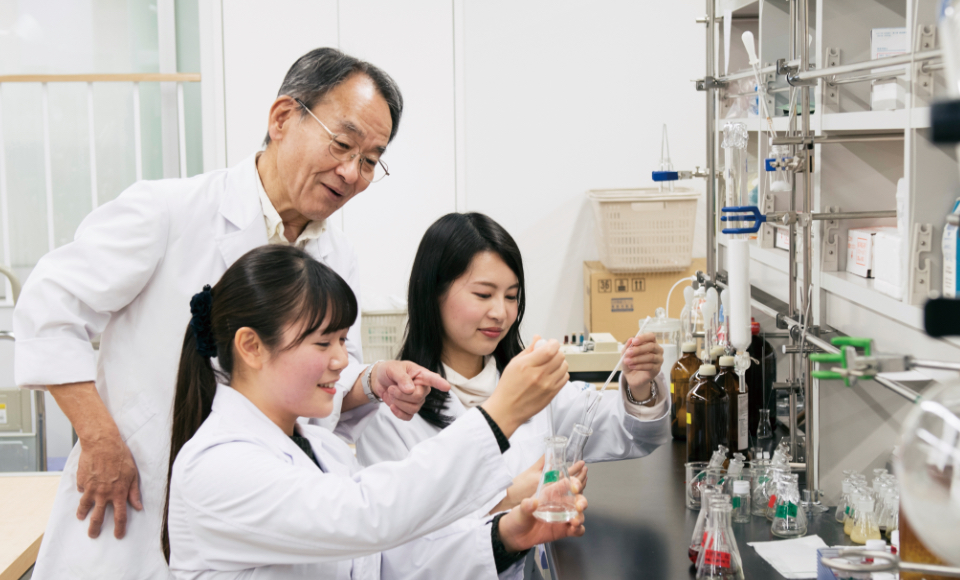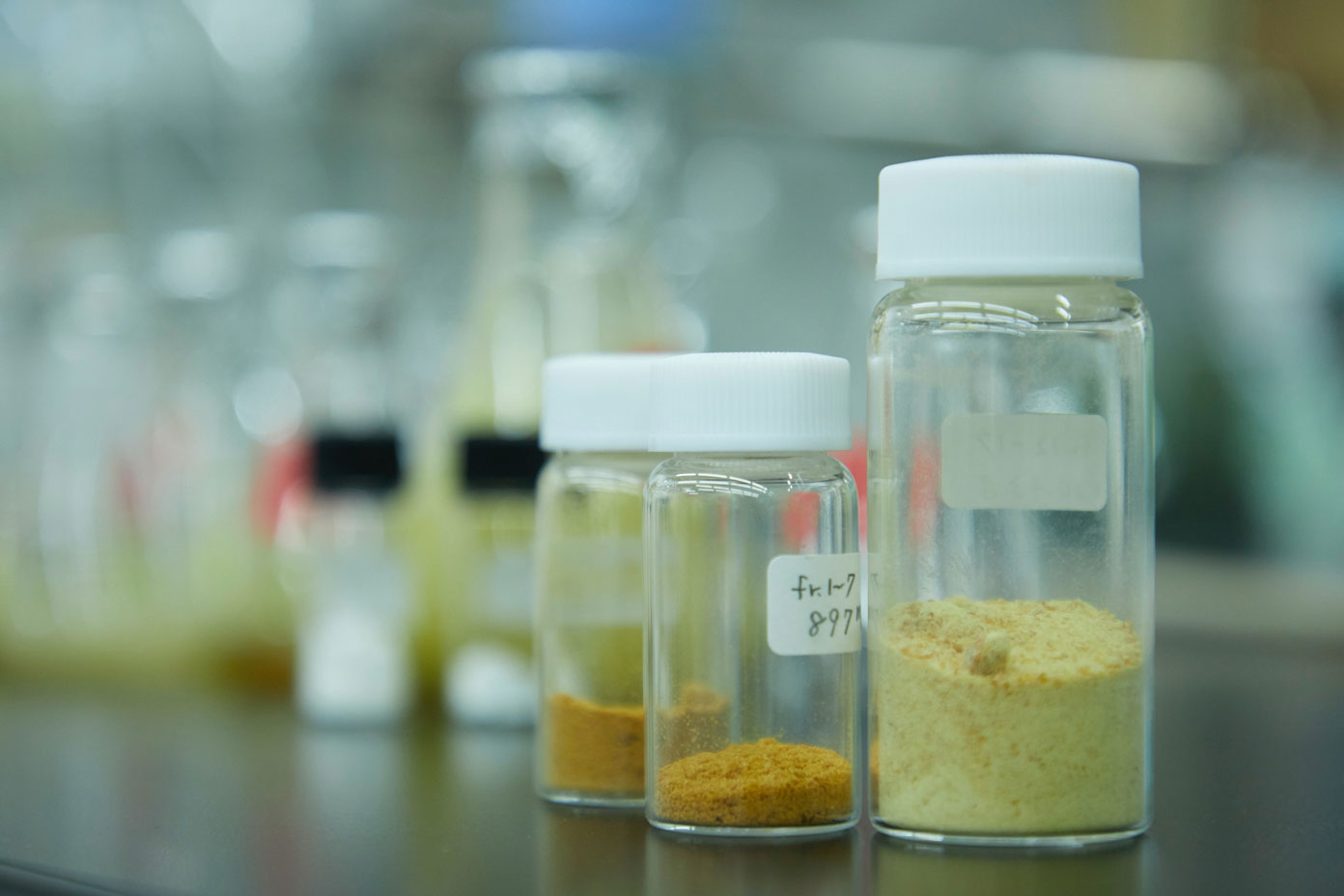

What is kampo pharmacy?
Kampo drugs currently provide high therapeutic efficacy in uses including disease prevention and health promotion, postoperative therapy, pain relief, and the relief of side effects caused by Western medicine. Around 80% of Japanese doctors utilize kampo drugs in some form, reflecting widespread recognition of their effectiveness.
Accordingly, the purpose of the Department of Kampo Pharmacy is to analyze and study ways of incorporating kampo into contemporary medical science, and to make use of them.
Amid rising awareness of the importance of medical care, the distinctive philosophy of kampo pharmacy, which emphasizes a balanced body, diet, physical constitution, and symptoms, will be increasingly in demand in medical care in future.
Given the widespread use of kampo medication in clinical practice, there is a need for pharmacists who understand the practical use of kampo in actual workplaces, such as hospitals that offer kampo treatments and dispensaries that receive their prescriptions.

Training human resources to be knowledgeable in both Western pharmacy and kampo pharmacy, with in-depth knowledge of kampo medicine and folk medicine
When you hear the words "kampo drugs," what image comes to mind?
If you imagine "traditional, old-fashioned drugs," you are mistaken. In the fields of disease prevention and health promotion, some kampo drugs achieve better results than Western medications. As a testament to their effectiveness, around 70% of Japanese doctors already make use of kampo medications. Nevertheless, pharmacy training to date has placed the greatest weight on Western medicine, and training pharmacists to acquire a wealth of practical knowledge of kampo has lagged behind. However, an increasing number of hospitals and clinics are now offering kampo-based treatment. This of course means that the dispensing pharmacies and drugstores that receive prescriptions are going to need pharmacists with expertise in kampo drugs. Researchers with in-depth knowledge of kampo drugs are also in demand in the research fields covered by pharmaceutical manufacturers. The Department of Kampo Pharmacy is training pharmacists skilled in kampo medicine who are needed in this era.

Research Fields
Medical Science
In this field, students acquire knowledge of chemical structures, physical and chemical properties, and reactivity, which is indispensable to pharmacology.

Drug Reactions
Understanding pharmaceuticals, which are chemical substances, from the standpoint of their chemical properties is the most basic requirement of pharmacology. This field studies the structure-activity relationships of drugs, which relates the actions of drugs to their structural formulae, as well as drug design and the organic chemical reactions that are the basis of drug molecule synthesis.
Medicine Analysis
This field studies qualitative and quantitative techniques for identifying all sorts of substances, using differences in chemical or physical properties that stem from differences between their structures. Analytical technology is a basic requirement in all areas of pharmaceutical research, and its further development is much needed.
Natural Product Chemistry
Using chemical methods to study and elucidate the compositions of the natural drugs that constitute kampo medications and of mixed formulations is an academic discipline that is essential to the understanding of kampo medicine. A future topic of research will be to utilize the techniques of structural organic chemistry to investigate changes in components and drug efficacy as a result of processing methods unique to kampo medications.
Drug Chemistry
As the first step in drug discovery research, screening for drug targets, formulating lead compounds, and the tasks involved in their optimization and candidate compound selection have not only changed beyond all recognition in recent years, but highly empirical methods are currently being used. The further development of this field based on organic chemistry is required.
Kampo Pharmacy
In this applied field, students investigate kampo theory and learn methods and evaluations for use in modern medicine.

Pharmacognosy
This field identifies the plant sources for not only the natural drugs that constitute kampo medication but also the individual natural drugs used as family drugs, folk drugs, and traditional drugs, and investigates their biological characteristics, ingredients, and actions as drugs. It also undertakes improvements in areas related to the development of commercial formulations, such as natural drug processing, methods of management and storage, differentiation methods, and testing methods.
Medicinal Resources
This research field looks for pharmaceutical sources in natural resources. This requires an approach based on the preservation of pharmaceutical raw materials, such as microbes, plants, animals, and minerals, as well as an approach from the perspective of folk drugs. In addition to the breeding, cultivation, production, and distribution of medicinal plants, it also addresses the use of biotechnology in animal and plant breeding.
Kampo Pharmaceutics
The physiological activity of natural drugs is generally less strong than that of synthesized drugs. Because of this, when such activity has been identified, more subtle means are required for the experimental demonstration of its effectiveness. In this research field, the aim is to enable the use of kampo medications today as evidence-based medicine, having gone through the same level of evaluation as required for new drugs.
Kampo Medical Treatment
When dispensing kampo drugs, pharmacists must have a knowledge of kampo clinical practice in order to provide guidance on taking medications, manage medication records, resolve prescription-related questions, and carry out ward-related tasks appropriately. This research field investigates diagnosis and treatment according to kampo theory, and promotes patient self-medication in kampo pharmacies.
